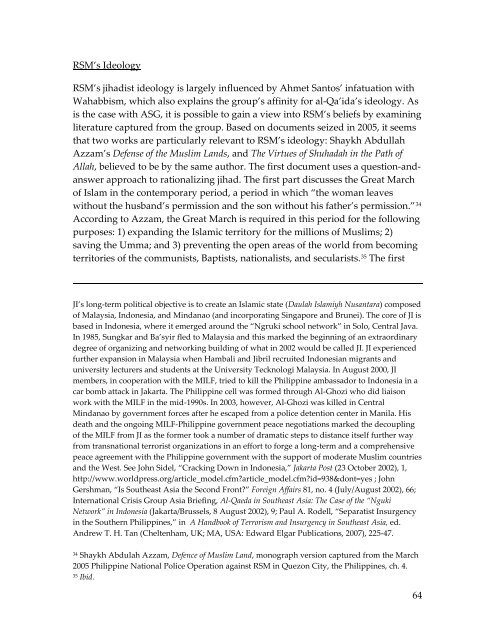Create successful ePaper yourself
Turn your PDF publications into a flip-book with our unique Google optimized e-Paper software.
RSM’s Ideology<br />
RSM’s jihadist ideology is largely influenced by Ahmet Santos’ infatuation with<br />
Wahabbism, which also explains the group’s affinity for al-Qa’ida’s ideology. As<br />
is the case with ASG, it is possible to gain a view into RSM’s beliefs by examining<br />
literature captured from the group. Based on documents seized in 2005, it seems<br />
that two works are particularly relevant to RSM’s ideology: Shaykh Abdullah<br />
Azzam’s Defense of the Muslim Lands, and The Virtues of Shuhadah in the Path of<br />
Allah, believed to be by the same author. The first document uses a question-andanswer<br />
approach to rationalizing jihad. The first part discusses the Great March<br />
of Islam in the contemporary period, a period in which “the woman leaves<br />
34<br />
without the husband’s permission and the son without his father’s permission.”<br />
According to Azzam, the Great March is required in this period for the following<br />
purposes: 1) expanding the Islamic territory for the millions of Muslims; 2)<br />
saving the Umma; and 3) preventing the open areas of the world from becoming<br />
territories of the communists, Baptists, nationalists, and secularists. 35 The first<br />
JI’s long-term political objective is to create an Islamic state (Daulah Islamiyh Nusantara) composed<br />
of Malaysia, Indonesia, and Mindanao (and incorporating Singapore and Brunei). The core of JI is<br />
based in Indonesia, where it emerged around the “Ngruki school network” in Solo, Central Java.<br />
In 1985, Sungkar and Ba’syir fled to Malaysia and this marked the beginning of an extraordinary<br />
degree of organizing and networking building of what in 2002 would be called JI. JI experienced<br />
further expansion in Malaysia when Hambali and Jibril recruited Indonesian migrants and<br />
university lecturers and students at the University Tecknologi Malaysia. In August 2000, JI<br />
members, in cooperation with the MILF, tried to kill the Philippine ambassador to Indonesia in a<br />
car bomb attack in Jakarta. The Philippine cell was formed through Al-Ghozi who did liaison<br />
work with the MILF in the mid-1990s. In 2003, however, Al-Ghozi was killed in Central<br />
Mindanao by government forces after he escaped from a police detention center in Manila. His<br />
death and the ongoing MILF-Philippine government peace negotiations marked the decoupling<br />
of the MILF from JI as the former took a number of dramatic steps to distance itself further way<br />
from transnational terrorist organizations in an effort to forge a long-term and a comprehensive<br />
peace agreement with the Philippine government with the support of moderate Muslim countries<br />
and the West. See John Sidel, “Cracking Down in Indonesia,” Jakarta Post (23 October 2002), 1,<br />
http://www.worldpress.org/article_model.cfm?article_model.cfm?id=938&dont=yes ; John<br />
Gershman, “Is Southeast Asia the Second Front?” Foreign Affairs 81, no. 4 (July/August 2002), 66;<br />
International Crisis Group Asia Briefing, Al-Qaeda in Southeast Asia: The Case of the “Nguki<br />
Network” in Indonesia (Jakarta/Brussels, 8 August 2002), 9; Paul A. Rodell, “Separatist Insurgency<br />
in the Southern Philippines,” in A Handbook of Terrorism and Insurgency in Southeast Asia, ed.<br />
Andrew T. H. Tan (Cheltenham, UK; MA, USA: Edward Elgar Publications, 2007), 225-47.<br />
34<br />
Shaykh Abdulah Azzam, Defence of Muslim Land, monograph version captured from the March<br />
2005 Philippine National Police Operation against RSM in Quezon City, the Philippines, ch. 4.<br />
35<br />
Ibid.<br />
64


